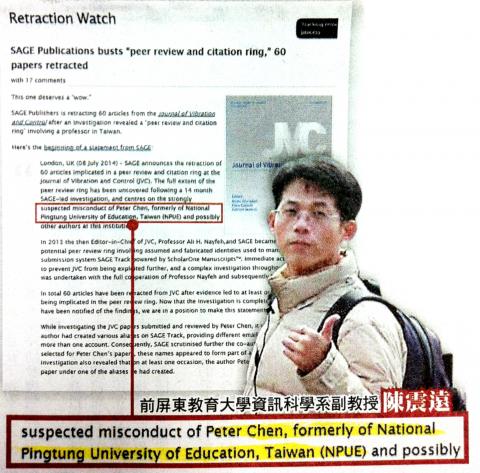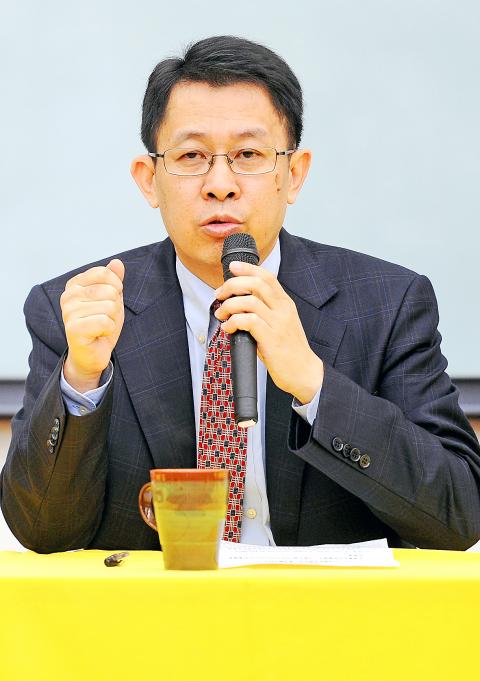A professor has been accused of academic fraud after 60 articles were withdrawn from a scientific journal.
The accusations are centered on Chen Chen-yuan (陳震遠), also known as Peter Chen, who has since resigned from his position as associate professor of computer science at the National Pingtung University of Education in southern Taiwan.
The Journal of Vibration and Control, a leading publication in the field of acoustics, retracted 60 papers linked to Chen, accusing him of “perverting the peer-review process” by creating fraudulent online accounts representing 130 academics to give favorable judgements on papers to help get them published, the Guardian reported on Thursday.

Photo: Liberty Times
The New York Times reported that Chen had set up a “peer-review and citation ring” consisting of fake scientists, as well as real ones whose identities he had assumed.
Sage Publications, which produces the magazine, said the retracted papers all had at least one author or reviewer implicated in the ring and that other scientists were involved in the activity.
The Washington Post reported that the ring was rigging the review process to get articles published and the mass retraction was “mind-blowing.”

Photo: Chu Pei-hsiung, Taipei Times
“A fraud accusation like nothing you’ve seen before,” wrote Pulitzer Award-winning reporter and business author Michael Hiltzik in the Los Angeles Times, adding “this one takes the cake” for academic fraud.
Taiwanese Nobel laureate and former head of Academia Sinica Lee Yuan-tseh (李遠哲) said yesterday that “this is disgraceful, a very terrible thing.”
“Taiwan’s academic community must take stock of this, the old way of ‘quantity over quality’ must change. In competing for funding and promotion, many Taiwanese professors aim for a high number of published papers,” he said.
Among the retracted papers, five have Minister of Education Chiang Wei-ling (蔣偉寧) listed as a coauthor.
Chiang convened a press briefing yesterday and denied involvement.
“The five papers are not fraudulent, they are solid works of research done by my doctorate and master’s students. I will ask them to find out why the retractions were made. We shall defend our rights as necessary,” Chiang said.
Chiang said that some problems might have occurred during the review and publication process.
“I was only responsible for supervising the papers,” he said, adding that the individuals responsible for the alleged fraud should clarify the situation.
Chiang said he was only involved because one of his doctorate students was Chen’s brother.
He said that the brothers had assisted each other to organize the papers to be published and were responsible for listing the coauthors, “but because I was busy with official functions, I had no knowledge of these things until recently.”
Associate professor of law at National Chengchi University Liu Hung-en (劉宏恩) said: “The widespread scale of the scandal and the audacity of the perpetrated fraud are unheard of.”
He said Chiang was being irresponsible.
“So he was the supervisor for student’s research and listed as a coauthor, but when things go wrong, he pins everything on the student,” Liu said. “The matter needs to be investigated.”

Conflict with Taiwan could leave China with “massive economic disruption, catastrophic military losses, significant social unrest, and devastating sanctions,” a US think tank said in a report released on Monday. The German Marshall Fund released a report titled If China Attacks Taiwan: The Consequences for China of “Minor Conflict” and “Major War” Scenarios. The report details the “massive” economic, military, social and international costs to China in the event of a minor conflict or major war with Taiwan, estimating that the Chinese People’s Liberation Army (PLA) could sustain losses of more than half of its active-duty ground forces, including 100,000 troops. Understanding Chinese

The Ministry of Foreign Affairs (MOFA) yesterday said it is closely monitoring developments in Venezuela, and would continue to cooperate with democratic allies and work together for regional and global security, stability, and prosperity. The remarks came after the US on Saturday launched a series of airstrikes in Venezuela and kidnapped Venezuelan President Nicolas Maduro, who was later flown to New York along with his wife. The pair face US charges related to drug trafficking and alleged cooperation with gangs designated as terrorist organizations. Maduro has denied the allegations. The ministry said that it is closely monitoring the political and economic situation

‘SLICING METHOD’: In the event of a blockade, the China Coast Guard would intercept Taiwanese ships while its navy would seek to deter foreign intervention China’s military drills around Taiwan this week signaled potential strategies to cut the nation off from energy supplies and foreign military assistance, a US think tank report said. The Chinese People’s Liberation Army (PLA) conducted what it called “Justice Mission 2025” exercises from Monday to Tuesday in five maritime zones and airspace around Taiwan, calling them a warning to “Taiwanese independence” forces. In a report released on Wednesday, the Institute for the Study of War said the exercises effectively simulated blocking shipping routes to major port cities, including Kaohsiung, Keelung and Hualien. Taiwan would be highly vulnerable under such a blockade, because it

UNRELENTING: China attempted cyberattacks on Taiwan’s critical infrastructure 2.63 million times per day last year, up from 1.23 million in 2023, the NSB said China’s cyberarmy has long engaged in cyberattacks against Taiwan’s critical infrastructure, employing diverse and evolving tactics, the National Security Bureau (NSB) said yesterday, adding that cyberattacks on critical energy infrastructure last year increased 10-fold compared with the previous year. The NSB yesterday released a report titled Analysis on China’s Cyber Threats to Taiwan’s Critical Infrastructure in 2025, outlining the number of cyberattacks, major tactics and hacker groups. Taiwan’s national intelligence community identified a large number of cybersecurity incidents last year, the bureau said in a statement. China’s cyberarmy last year launched an average of 2.63 million intrusion attempts per day targeting Taiwan’s critical